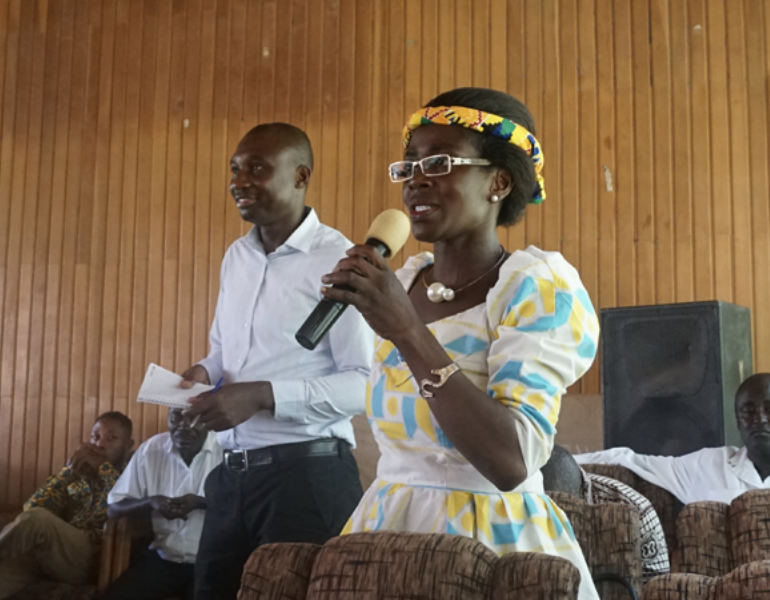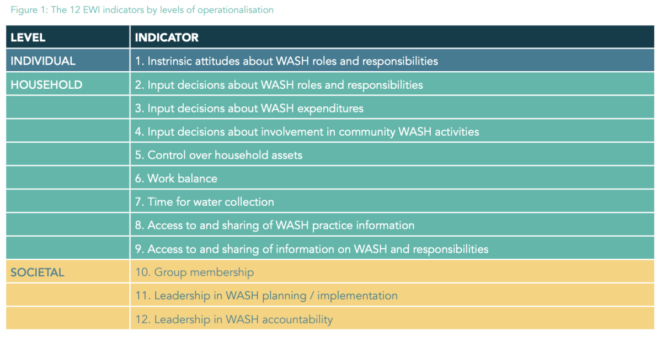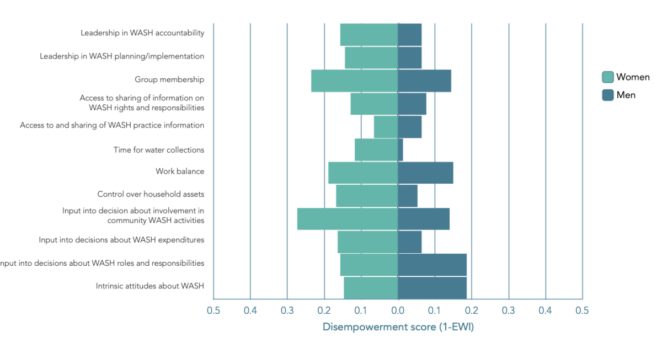Using the Empowerment in WASH Index to strengthen gender dimensions in Asutifi North District, Ghana

This case study is part of the SEI Urban Toolbox for Liveable Cities which has been developed by the SEI Initiative on City Health and Wellbeing. The Urban Toolbox is a collection of tools, developed within SEI or in coordination with SEI, aimed at supporting planning and decision-making for improving the health, well-being and resilience of city residents and urban systems more broadly. It demonstrates how EWI can be used to strengthen gender dimensions in WASH plans.
Introduction
Access to safe water, sanitation and hygiene (WASH) services is critical for gender and social equality, including women’s empowerment. This is because in many low-and middle-income countries women do the majority of water collection and management work.
Improved monitoring tools are key to ensuring that gender and social equality outcomes receive priority attention within policy and practice related to WASH. The Empowerment in WASH Index (EWI) is a new assessment and monitoring tool that aims to close the evidence gap on the links between WASH interventions and the empowerment and wellbeing of individuals. Challenges identified by EWI go beyond infrastructure-oriented solutions and address more structural (e.g. social norms, governance systems) changes. Thus, quantitative data collected with the EWI tool allows for more informed and equitable action planning of WASH interventions.
This policy brief provides an overview and key findings of the EWI study in Asutifi North District, Ghana and presents recommendations drawn from dissemination workshops held at a District Level Learning Alliance Platform (DLLAP) at the Asutifi North District Assembly and a National Level Learning Alliance Platform in Accra.
*This Urban Toolboxcase study is an abridged version of the original text, which can be downloaded from the right-hand column. Please access the original text for more detail, research purposes, full references, or to quote text.
Methodology
Study site and context:
The Empowerment in WASH Index tool was piloted in Asutifi North District: a district with a population of 62,816 people projected for 2017, located in the newly created Ahafo Region. The district capital is Kenyasi.
In order to achieve Sustainable Development Goal 6 (SDG 6) – ensure availability and sustainable management of water and sanitation for all – Asutifi North District united under the Ahonidie Mpontuo initiative (ANAM). The aim is to provide safe and sustainable water, sanitation and hygiene (WASH) services to the entire population living in the district by 2030. The 2018 Asutifi North District WASH master plan sets out the strategic steps needed to achieve this goal.
Although the master plan touches on equality and inclusion, a comprehensive analysis of equality and inclusion challenges in the district is missing. The Empowerment in WASH (EWI) Index study was conducted in Asutifi North to increase understanding of gender dimensions that require attention to achieve the master plan and SDG 6.
Approach:
The Empowerment in WASH Index (EWI) measures agency, participation, and empowerment in the WASH sector. It was developed by the Stockholm Environment Institute and Queens University, in collaboration with IRC and with input from local WASH authorities, NGOs, traditional leaders, women’s and youth groups.

In Asutifi North District, the Empowerment in WASH Index (EWI) served to identify levels of empowerment related to WASH, as well as gaps in empowerment of men and women. During data collection, surveyors spoke with male and female principal decision-makers from the same household and collected individual responses with a mobile phone application. They surveyed 300 households over a week in May and June 2018, across 20 rural and peri-urban communities.
Across the 12 indicators, a respondent had to achieve a threshold of at least 75% in order to be considered empowered. The calculation of the index is described below:
EWI = % Empowered respondents + (% Disempowered respondents*% of Indicators achieved by those disempowered )
Outcomes and Impacts
Key findings:
- Male respondents were more empowered in WASH than female respondents with the final EWI scores 0.9 and 0.84, out of a maximum score of 1, respectively.
- Individual level contributes more to disempowerment for men compared to women, while the household and community levels contribute more to disempowerment for women compared to men.
- The two main contributors to women’s disempowerment are input in decisions about involvement in community WASH activities and group membership.
- The two main contributors to men’s disempowerment were intrinsic attitudes in WASH and input into household decisions on WASH roles and responsibilities (see figure below).

Recommendations:
EWI findings were shared in Kenyasi, Asutifi North and Accra in April 2019 and a diverse group of stakeholders formulated recommendations for action.
- Recommendations at the district level include institutionalising regular stakeholder engagement and information flows with women’s groups; promoting women’s and marginalised peoples groups’ (e.g. youth, persons with disabilities) participation in decision-making around community WASH planning and activities; and sharing knowledge and providing WASH education targeting men at household and community levels.
- Recommendations at the community level include encouraging people to see WASH tasks as shared responsibilities and addressing WASH as a regular discussion theme in family and community meetings.
- Recommendations at the national level include supporting leadership for women, intensifying behaviour change communication and gender education, and conducting annual gender audits in WASH programmes and budgets.
Refer to the full brief to explore these in further detail.
Implications:
- This study indicates significant potential for greater monitoring of empowerment as an outcome of WASH interventions.
- Importantly, the EWI study indicates that technical and infrastructure-oriented WASH solutions are not sufficient to address the identified challenges.
- Information provided by the EWI can inform strategic planning, increasing the effectiveness of the district WASH master plan in empowering individuals and ensuring no one is left behind.
- These findings also highlight the importance of SDG 6 in making progress towards SDG5, addressing gender inequality and SDG10, addressing other inequalities.
Suggested Citation:
Bori, S., Dickin, S., Bisung, E., Atengdem, J. (2019) Measuring empowerment in WASH : Ghana. SEI Policy Brief.
(0) Comments
There is no content